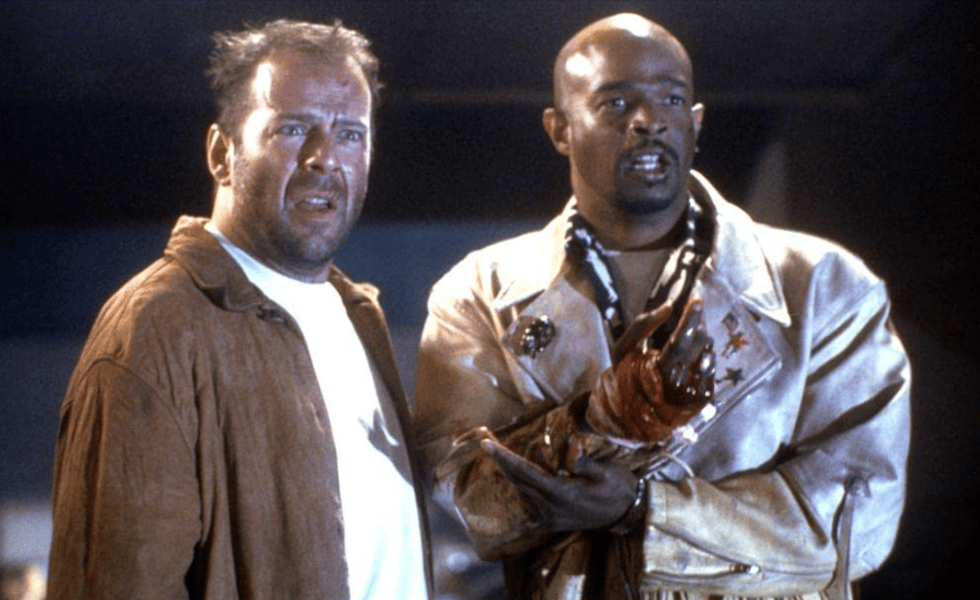Willis + Black + Scott = hardboiled action magic, as our critic Travis Johnson avows
Bruce Willis has announced his retirement, the star’s family confirming what had been long rumoured: he was suffering from a degenerative condition (aphasia, as it turned out) that was robbing him of his ability to perform – indeed to easily communicate. A sad last stanza to his career, but one that puts his recent baffling acting choices into context: Willis was banging out near-cameos in low budget actioners for millions, as long as the hours were short and the travel not too arduous. Fair play, really, and fuck the Razzie Awards, who recently inaugurated a Worst Performance by Bruce Willis category but walked it back when this announcement caught them in the floodlights, revealed for all to see as the joyless, mean-spirited pricks they are.
If we can take some comfort, it’s that Willis’ revelation has people wisely skipping over the last few years of his output to assess his prior body of work, which is the canon of a hugely talented, inquisitive, and exploratory performer who was often at his best when he stepped outside his comfort zone. He first found fame as TV star in the groundbreaking dramedy Moonlighting and tried to cross over to movies with a few middling comedies, but it was pivoting to action that made him a box office star with 1988’s Die Hard. Action became his bread and butter, but it was when he stepped outside of that well-worn genre groove that things got interesting – he did horror (The Sixth Sense), science fiction (12 Monkeys, The Fifth Element), and made a habit of turning up in what could best be labelled as blockbuster arthouse – the kind of outré fare that still attracts (or attracted – these are dark times) a decent audience: Pulp Fiction, Moonrise Kingdom, Fast Food Nation, et al. Even among his failures we find interesting items – Bonfire of the Vanities is not the work of a man treading water, and neither is erotic thriller Color of Night, however you rate the end results.
But it’s action he’ll be best remembered for, which means Die Hard, but everyone will be writing about Die Hard, so instead let’s sing the praises of 1991’s The Last Boy Scout, which sort of has scrappy underdog status in the upper echelons of Willis’ canon. Everyone acknowledges Die Hard as an action masterpiece, but The Last Boy Scott is a little too mean, a little too ugly, a little too pessimistic, and a little too rough around the edges (all out war in the editing room on this one, mes freres) for universal acclaim. That’s what stokes the ardour of its adherents, at least in part – you have to cheer louder for a plucky battler.
Not that The Last Boy Scout looks weak on paper – starring Bruce Willis, script by Shane Black, then hot off Lethal Weapon, and directed by action auteur Tony Scott (Top Gun, Crimson tide, True Romance, etc etc). That’s a killer triple threat right there, and it’s a shame we didn’t get more interplay between these guys down the track – The Last Boy Scout is the only time they all worked together.
In terms of story, the film is in many ways a typical project for all three of its principals: Willis is down-on-his-luck private eye Joe Hallenbeck, who takes a case from his friend Mike (Bruce McGill) to keep an eye on stripper Cory (Halle Berry). When both Mike and Cory are brutally murdered, Joe teams up with Cory’s boyfriend, ex-quarterback Jimmy Dix (Damon Wayans) to track down the bad guys, ultimately uncovering high levels of corruption in professional football (it’s all about blackmailing and/or murdering politicians to legalise sports gambling – which is quaint as hell 30 years on, like a prohibition-era gangster picture).
The actual plot doesn’t matter, for all that Black, a hard-boiled connoisseur, loves his tricksy Chandleresque narrative Jenga towers – they’re an excuse to string together some action beats, witty tough guy dialogue and noirish philosophical ruminations, which is what we’re here for. Scott, one of the great action directors of all time and a master of mood, is on hand for the fights and the flickering lights sweeping through columns of smoke and sheets of rain, plus the sweaty-gorgeous L.A. street scenes. But it’s Willis’ turn as Hallenbeck that is really worth paying attention to.
If Willis has a type as an actor, it’s the wisecracking underachiever – the smartest guy in the room who has somehow found himself at the bottom of the pile. He’s like Bugs Bunny – always outgunned, never outthought, able to puncture the egos of the self-important with a well-timed barb. He acts like he’s winning even when he’s losing. That’s John McClane, that’s David Addison, and that’s Joe Hallenbeck.
Only Joe is really losing. His wife (Chelsea Field) is cheating on him – with his buddy Mike, no less (the infidelity and Mike’s death is a clear nod to The Maltese Falcon). His tween daughter, Darian (Danielle Harris, familiar to fans of the Halloween franchise) all but hates him. He saved the President from assassination back when he was a Secret Service agent but lost his career when he sprang a senator roughing up a sex worker. He’s an alcoholic consumed by self-loathing – when we meet him he’s passed out in his car and neighbourhood kids are tossing a dead squirrel at him through the open window. A short while later he catches a glimpse of his ravaged features in the rear view mirror and gives himself a little pep talk: “”Nobody likes you. Everybody hates you. You’re gonna lose. Smile, you fuck.”
Joe’s exhausted wisecracks sometimes feel like the only thing keeping him from eating his gun, and this kind of nihilism permeates the rest of the film – at least initially. Wayans’ Jimmy Dix is a self-loathing sybarite nursing a painkiller addiction and mourning the pregnant wife who died in a car accident while he was playing the game of his career. Jimmy was cheating on Cory at the time of her murder, too, the self-pitying charmer – and these are our heroes, although perhaps only because everyone around them is even more fallen, craven, or at the very least broken.
But The Last Boy Scout is a hard-boiled detective story, and I’d be surprised if Black wasn’t cogniscant of Raymond Chandler’s dictum that “…down these mean streets a man must go who is not himself mean, who is neither tarnished nor afraid.”. At its heart, The Last Boy Scout is the story of a man realising that he is Chandler’s hero, despite his many failings, “…a man of honour—by instinct, by inevitability, without thought of it, and certainly without saying it.”
The world that Black and Scott portray here is even more debased and awful than anything Chandler imagined for Philip Marlowe’s adventures, and that means that Joe and Jimmy are a few rungs further down the respectability ladder than Chandler’s detective hero. Their world breaks people, makes them mean and scared and greedy. It tried to break them both, with both Joe and Jimmy ruined by the institutions they pledged fealty to. But ultimately, even when they’ve lost almost everything, when the rubber meets the road (and Taylor Negron’s villain meets the helicopter blades – this film’s climax is wild) they choose to do the right thing despite the personal cost, earning their spurs are tarnished armour.
What sells that arc, from bleak nihilism to battered hope, is Willis’ performance (Wayans is fine, but struggles with some of the more emotional scenes). 30 years on from first seeing The Last Boy Scout, what really makes a mark, more than the action and the blistering Shane Black dialogue, is Hallenbeck’s weary humanity. This is a guy who has been absolutely battered by life, just utterly dragged by injustice and indifference, and he’s still holding on by his last ragged fingernail, determined to see this nightmare case through to the end.
Which throws Willis’s recent career woes into a different light, come to think of it. That could be why I unconsciously gravitated to The Last Boy Scout for this one (I could burn 1500 words on any of a dozen Willis flicks without blinking). Willis was the butt of many jokes during his million-a-day straight-to-home-release era, but it seems to me that, in the most charitable light, this was a man determined to see things through to the end – to keep doing what he does. Willis has always been a worker, someone who seemed to love the process of filmmaking as much as, if not more than, the end result. It wasn’t unusual for him to do three or four movies a year at his peak – in 2006 he’s credited in eight.
Not being able to do that anymore must have been devastating, and so when we apprise the last act of his career, we should take that into account. Perhaps Willis was, like Hallenbeck, just trying to see the thing through on his own terms.







